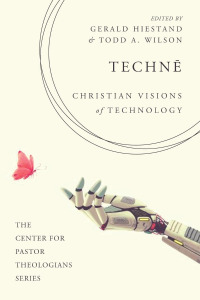Friday, March 22, 2024

 As part of the student fellowship program at the Center for Apologetics and Cultural Engagement, we work with our student fellows to develop book reviews about significant books that overlap their interests with those of the Center. The following review of Gerald Hiestand’s and Todd A. Wilson’s Technē is part of that ongoing initiative.
As part of the student fellowship program at the Center for Apologetics and Cultural Engagement, we work with our student fellows to develop book reviews about significant books that overlap their interests with those of the Center. The following review of Gerald Hiestand’s and Todd A. Wilson’s Technē is part of that ongoing initiative.
Long ago there was a city with grand aspirations. The people of this city set out to accomplish a feat of both technology and engineering: “a tower with its top in the heavens…lest [they] be dispersed over the face of the whole earth” (Genesis 11:4). While the account of Babel is only one piece of the long story of humanity’s technological advancement, our current era of smartphones, artificial intelligence, genetic engineering, and other wonders seems disconnected from the warnings and wisdom inherent in these stories of the past. Considering humanity’s complex relationship with technology, how should the church reckon with the seemingly ceaseless stream of ethical challenges posed by new technologies? Gerald Hiestand and Todd A. Wilson edited Technē: Christian Visions of Technology to present the unique perspectives of fourteen authors who draw on the resources of theological studies, biblical anthropology, and church history to address a variety of technological issues.
Technology and the Human Condition
While technology has advanced in a myriad of forms throughout history, its development has reflected a few central themes. For instance, as Christopher Ganski states, “technology at its heart always raises questions of what it means to be a human being” (82). Our creations reflect our own nature, and thus anthropology. Consequently, several of the authors include substantive sections detailing how a biblical understanding of humanity impacts their specific topics.
The complex ethical and philosophical concerns relating to artificial intelligence necessitate a robust anthropology. When we have a clear understanding of human identity, we are more equipped to seek answers to questions of consciousness and moral agency. For example, Bruce Baker argues that machines will never reach consciousness based on the transcendent and spiritual nature of humanity. On the other hand, Missy DeRegibus says that while “it looks unlikely that computers will end up possessing the consciousness and qualia necessary to become moral agents,” it is not impossible (145). Considering this, she stresses the importance of acknowledging the goodness of our physical embodiment as part of the biblical witness to the nature of what it means to be human. Her claim contrasts with the claims of secularists who assert that intelligence is the fundamental aspect of humanity. If the mind is the only important part of the human person, then the body is reduced to being “the appendix that is no longer needed,” an unfortunate leftover that only gets in the way. Instead, DeRegibus reminds her readers of the greatest endorsement of the significance of physical embodiment in history: the incarnation. In the incarnation, God embodies flesh and thus unquestionably grounds the value of all aspects of humanity, including both the mental and the corporeal. As artificial intelligence continues to become more advanced, remembering this biblical truth will provide wisdom to the church as new questions arise about the characteristics of humanity.
Reproductive technology is another area of ethical controversy that demands a carefully formed biblical view of human identity. Nathan Barczi asks how our definition of the imago Dei affects the ethical questions of gene editing. He argues for a vocational (rather than functional) view of the image of God. This vocational view asserts that the primary distinction between humanity and the rest of creation “is not in the first instance a set of capacities, but a calling” (155). In advocating for this view, he upholds the humanity of unborn embryos even when they may not display certain “humanlike” characteristics such as rationality. The unborn is valuable not simply because of one or more qualities it has but because of its relationship with its creator (see Nicholas Wolterstorff, Justice, 389–393). After defending the personhood of the unborn, he warns against the dehumanization that emerges from certain forms of genetic experimentation.
A Look at the Past
The challenges posed by technological advancement are many. To help make sense of the “wide, wild, and unwieldy world which is contemporary Christian discourse on the question of technology,” it is wise to turn to the wisdom of the Christian tradition (16). The authors of Technē consistently draw on Christian theologians from throughout history. For example, Jonathan Huggins engages with the works of Saint Augustine and Jonathan Edwards to draw conclusions about technology as it relates to entertainment, distraction, and beauty. His insights show the importance of asking how our practices may or may not contribute to a flourishing life.
Jennifer McNutt provides a fascinating case study of the interplay between the church and technology. In particular, she discusses the vital role of the printing press in the Protestant Reformation. Not only was the printing press itself key to the dissemination of the Reformers’ writings, but the technical experts of the day also played an indispensable role. Much of the success of Reformers such as Luther and Calvin rested largely on their willingness to cooperate with those who operated the printers. In fact, some of these operators, killed for their support of the Reformation, were “added to the martyrologies of their day as exemplars of what it meant to advance the true church” (231). When looking at how to address technology in our own age, we should acknowledge the willingness of those who came before us to partner with those who were the technological experts of their day.
A Look to the Future
Technē: Christian Visions of Technology brings to the reader’s attention a variety of issues found in the overlap between theology and technology. It provides an excellent springboard for those interested in the complexities of technological ethics while also providing general principles that apply to all areas of technology. Because Technē is a collection of works by different authors, it does not always address issues in as much detail as might be helpful. However, what it lacks in depth, it makes up for in breadth. Technology now defines our lives in ways we often do not notice. The future will bring even more ethical questions relating to technology that believers must answer. Hiestand and Wilson contribute to the task of educating the church so that we may be informed in our responses to a rapidly changing world while also grounding the reader in what remains unchanged: Christ, our foundation.
Cameron Bonin (or C. S. Bonin, in imitation of one of his favorite writers) is an undergraduate student at Liberty University working toward a degree in Computer Science: Software Engineering with minors in Theology and Apologetics. His academic interests include theoretical computer science and the ways in which this discipline can provide unique insights into theological questions. When he’s not spending his time deciding whether he wants to pursue graduate studies in Computer Science or in Theology, he enjoys traveling, watching the snow fall, and learning from others.